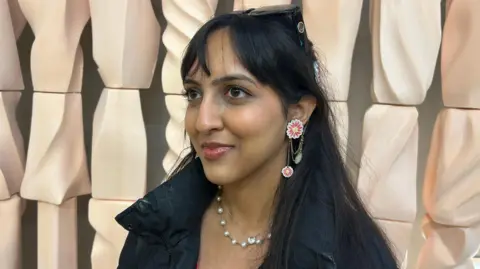'I made my cochlear implant a fashion accessory'
 BBC
BBC"I don't think disability should be hidden. It's not about the style - it's about purpose and amplifying hidden voices."
Gargi Agrawalla, who was born profoundly deaf, wants to empower other deaf young people after winning an international competition to design jewellery for use with cochlear implants and hearing aids.
The Loughborough University student's winning Junkyard Dog Flower design has now been made into jewellery by award-winning creators Deafmetal and is being sold in aid of charity Auditory Verbal UK.
"It's about turning something magical into something expressive and stylish, helping wearers feel more confident and proud of their identity," she said.
Ms Agrawalla, who has had a cochlear implant since the age of 12, said the device transformed her life but it was "really hard" catching up with communications skills.
"It was extremely difficult to be able to integrate with the hearing world, to be able to communicate with a lot of people because I only had my parents and very few people, like speech therapists, maybe one or two good friends who are understanding enough.
"I was bullied growing up. So, it was really hard to be integrated with the society in general," she said.

She said she was inspired by Love Island's first deaf contestant Tasha Ghouri and Jenni Ahtiainen, who founded Deafmetal, a jewellery brand for hearing devices.
Ms Agrawalla said turning hearing devices into fashion pieces "empowers thousands and thousands of deaf people all over the world".
"For the competition... I used the theme, Junkyard Dog Flower. It's basically a symbol of resilience, wrapped in delicate beauty because that's what living with deafness feels like.
"You grow through the rough and then you bloom anyway. So, that's how I view the deaf community," she said.
'Source of strength'
Ms Agrawalla said she wanted to raise money for Auditory Verbal UK, so other children do not have to struggle like she did.
"They empower deaf babies and children to develop listening and spoken language through early intervention and auditory verbal therapy," she said.
"I believe every child deserves the opportunity to thrive."
She said she also aimed to "bridge the gap between design and disability to create products, platforms, and inclusive spaces".
"I want to keep designing, advocating... to empower other young people, especially those with hidden disabilities, to take pride in their identity and use it as a source of creativity and strength."
Follow BBC Leicester on Facebook, on X, or on Instagram. Send your story ideas to [email protected] or via WhatsApp on 0808 100 2210.
